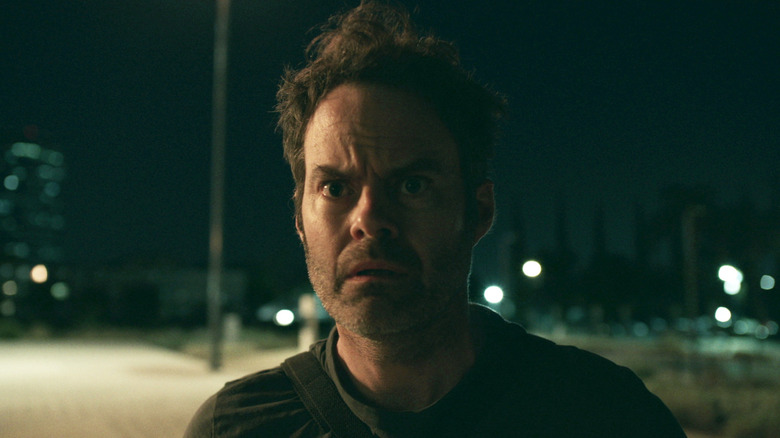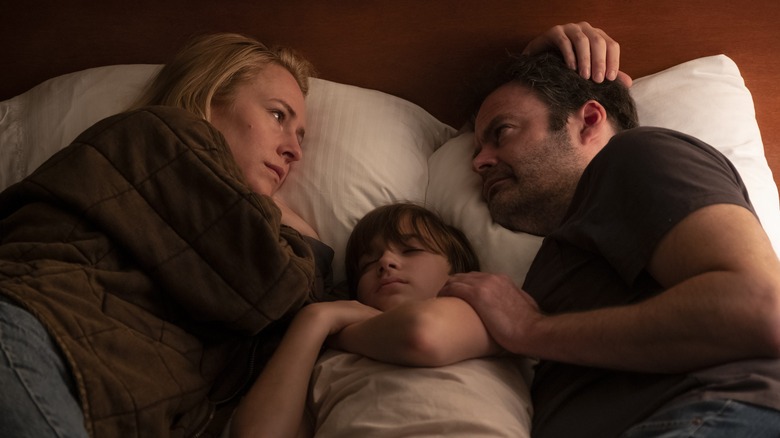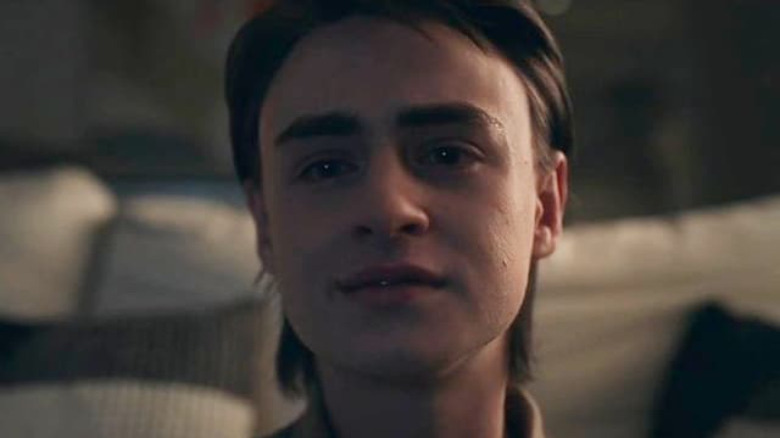The Barry Finale Is The Ultimate Critique Of The True Crime Industry
This article contains spoilers for the "Barry" series finale.
Looking back, the relatively innocent first few episodes of "Barry" back in season 1 seem like they belong to an entirely different show compared to where the dark final season and the crushing series finale, "wow," winds up by the time the credits roll for the last time. From the very beginning, the show has played with the difference between the make believe drama on the theater stage and the high stakes consequences of the real world. Originally, the character of Barry Berkman (Bill Hader) chose Gene Cousineau's (Henry Winkler) acting class as a respite from moonlighting as a murderous hitman. However, as the series went on, the line between Barry's stage life and real life started to blur, causing every major character to become caught up in the wake of Barry's narcissism and delusions of grandeur.
Transitioning from more of an action comedy at its inception, in its final episode, "Barry" became somewhat of a meta-commentary about the exploits of the Hollywood system. After eight years out in the wilderness, news of a biopic based on Berkman's life start to circulate, luring Cousineau and Barry back to Los Angeles for one last shot for fame and vengeance. The movie within a TV show construct works beautifully here, allowing "Barry" to serve as a cautionary tale about ego and self-righteousness while still being able to work as a send up of the public's fascination with the true crime genre.
The ultimate irony is that all Barry wanted was to live a quiet life with Sally (Sarah Goldberg) and their son John (Zachary Golinger) where all his past sins were forgiven. Instead, he's eventually redeemed once his biography, "The Mask Collector," finally comes out years after his own demise. The movie makes Barry into a hero, but the entire story is based on a lie.
Turning a killer into a star
When Cousineau first took Barry under his wing to mentor him as an actor, he became the father figure that Barry needed, not the manipulative handler that Fuches (Stephen Root) had become by molding Barry into an unfeeling assassin. Fuches made Barry a killer; Cousineau turned him into something even worse — an actor.
Teaching him everything he knows, Cousineau filled Barry with the same desperation that most actors feel as they fight to overcome impossible odds to land their big break. Acting awakens something darker in Barry because he starts drawing on his own traumatic memories as a soldier and as a hired hitman to find some emotional truth on stage. Once he found the spotlight, Barry was suddenly a lot more dangerous and unpredictable.
In the final minutes of "wow" when parts of "The Mask Collector" are shown, the fictional Barry (played by Jim Cummings) says, "I did what you told me to Mr. Cousineau. All that terrible stuff I told you, it worked. I used it." For all of Cousineau's warnings earlier in season 4 about how exploitative the genre is and how it glorifies terrible people, that's exactly what he ended up doing with Barry. Interestingly, that's the only thing shown in "The Mask Collector" that actually happened the same way in real life.
The rest of "The Mask Collector" follows the false narrative that Gene framed Barry for the murder of detective Janice Moss, unjustly sending him to prison. Barry finally becomes the hero and more importantly, a star. In it's own way, "The Mask Collector" becomes a critique on our own binge-worthy obsession with the true crime genre that turns serial killers into misunderstood anti-heroes that reach a certain celebrity for committing heinous acts and unspeakable crimes. Barry never wanted to be a celebrity necessarily, he only wanted redemption. In death, he ended up achieving both.
Wouldn't you watch too?
Earlier on in "wow" where Sally and John have been kidnapped and held hostage by NoHo Hank and the Chechens, Sally finally connects with her son by telling him the truth. They're fugitives on the run, which isn't exactly something you're prepared to find out as an eight-year-old boy. After Barry meets his end at the hands of Cousineau, the episode jumps forward in time once again, showing a teenage John (now played by Jaeden Martell) heading off with his buddies for a sleepover. What his mom doesn't know is they are planning to watch the true crime story of Barry's life, something that Sally has forbidden John from ever seeing.
For us, the audience, "The Mask Collector" is full of falsehoods and fun callbacks to the series, showing Barry deliver the monologue from "Macbeth," for example, instead of Sally who was actually the one to receive all the acclaim for that performance. The fictionalized Cousineau is also shown as a cross between NoHo Hank and Fuches involved in laughable backdoor deals that Barry just happens to stumble upon. For John, watching for the first time, this is all the gospel truth.
In this warped version of Barry's life, he's redeemed in the eyes of his teenage son. John believes the lie and while that's cathartic for his character, it's also a subtle stab at our own fascination with true crime and how we tend to believe whatever ends up on the screen, regardless of the psychological and emotional toll that may have on the real people involved.
A happy ending of sorts, Barry believed in the afterlife for purely selfish reasons and, in a bizarre twist of fate, finally got his redemption after his life had ended.


